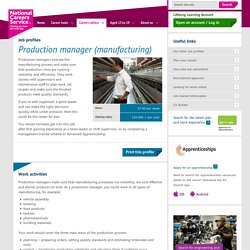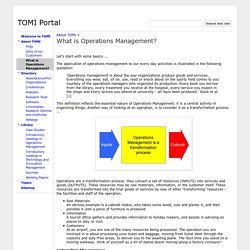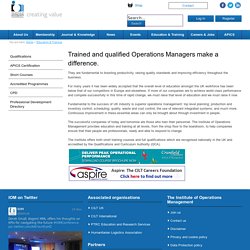

Production manager: Job description. A production manager is involved with the planning, coordination and control of manufacturing processes.

They ensure that goods and services are produced efficiently and that the correct amount is produced at the right cost and level of quality. The scope of the job depends on the nature of the production system: jobbing; mass; process; batch production. Many companies are involved in several types of production, adding to the complexity of the job.
Most production managers are responsible for both human and material resources. The job role is also referred to as operations manager. Typical work activities The exact nature of the work will depend on the size of the employing organisation. Production manager: job description. Production manager (manufacturing) Job Information. Page Content Production manager (manufacturing) Hours37-40 per weekStarting salary£20,000 + per year Production managers oversee the manufacturing process and make sure that production lines are running smoothly and efficiently.

They work closely with supervisors and maintenance staff to plan work, set targets and make sure the finished products meet quality standards. If you’re well organised, a good leader and can make the right decisions quickly while under pressure, then this could be the career for you. You would normally get into this job after first gaining experience as a team leader or shift supervisor, or by completing a management trainee scheme or Advanced Apprenticeship. WorkDesc Work activities Production managers make sure that manufacturing processes run smoothly, are cost-effective and deliver products on time. Vehicle assemblybrewingfood productstextilespharmaceuticalsbuilding materials. Case studies: Production manager: Alex. Doing an industrial placement may open up permanent job opportunities like it did for Alex...

On the back of an industrial placement I did for an aerospace company I was able to secure work as production engineer with the same employer, after I finished university. A few months later I was promoted to the position of production manager. My main responsibility is to ensure that new products are produced in an efficient and cost-effective way. My aerospace manufacturing engineering degree equipped me with the technical knowledge necessary to perform a great range of technical tasks. I also attended some internal training on management skills once I got promoted.
My role has developed a lot and being transferred internally twice has given me a better understanding of the company's functions. In general I have to ensure that the production of new products is on schedule and deal with emergency issues, such as machinery breakdowns. I really enjoy my job. Case studies. So, what do you do?

I am responsible for a production of several products, from obtaining the raw materials through to manufacture and packaging of the tablets and capsules. This involves managing a team of approximately 50 people, operators, first line managers, technical staff and planners. It’s my job to ensure the continuous supply of products to tight deadlines. What does your typical day involve? Now that the company is working towards 'Lean Manufacturing' the day has a lot of structure to it. Why did you decide on a career in the pharmaceutical industry? I have always wanted to work in the healthcare industry, first in hospitals and now in a pharmaceutical company making medicines.
When did you make this decision? I had recently qualified as a Biomedical Scientist in Microbiology, (or MLSO as it was known then) at Great Ormond Street Hospital and a Microbiology Supervisor position came up in a pharmaceutical company very close to where I lived. Learn Educate Discover - Discover What You Were Meant To Do. What is Operations Management? - TOMI Portal. Let's start with some basics ...

The application of operations management to our every day activities is illustrated in the following quotation: 'Operations management is about the way organizations produce goods and services. Everything you wear, eat, sit on, use, read or knock about on the sports field comes to you courtesy of the operations managers who organized its production. Every book you borrow from the library, every treatment you receive at the hospital, every service you expect in the shops and every lecture you attend at university - all have been produced.' Slack et al [1] This definition reflects the essential nature of Operations Management: it is a central activity in organizing things. Operations are a transformation process: they convert a set of resources (INPUTS) into services and goods (OUTPUTS). Raw Materials An obvious example is a cabinet maker, who takes some wood, cuts and planes it, and then polishes it until a piece of furniture is produced. Chartered Management Institute.
Process Automation Technologies. Logistics & Transport. Institute of Leadership and Management. IOMNet > Home. Careers in the Food & Drink Industry. TOMI Portal. IOMNet > Education & Training. They are fundamental to boosting productivity, raising quality standards and improving efficiency throughout the business.

For many years it has been widely accepted that the overall level of education amongst the UK workforce has been below that of our competitors in Europe and elsewhere. If more of our companies are to achieve world class performance and compete successfully in this time of rapid change, we must raise that level of education and we must raise it now. Fundamental to the success of UK industry is superior operations management: top level planning; production and inventory control; scheduling; quality, waste and cost control; the use of relevant integrated systems; and much more.
Continuous improvement in these essential areas can only be brought about through investment in people.